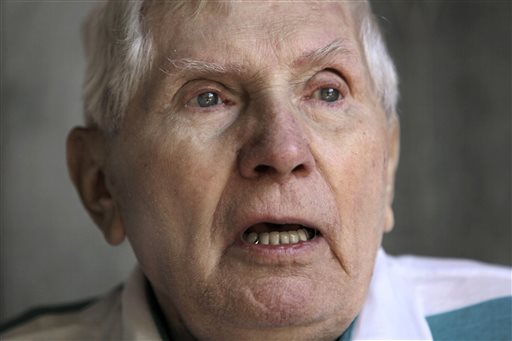Man under deportation order for Nazi police connection dies in Michigan
Thursday, July 10, 2014
DETROIT - A man under a deportation order for serving in a Nazi-controlled police force during World War II has died in Michigan at age 93 after years of denials that he shot at Jews.
John Kalymon of Troy died at his suburban Detroit home on June 29. He had pneumonia, prostate cancer and dementia, son Alex Kalymon told The Associated Press.
"The last two years he had no idea about anything about his life," the son said Wednesday. "He was just struggling to live and his mind wasn't there."
A federal appeals court last year upheld a deportation order against Kalymon, but the U.S. couldn't find a country that would take him.
In Munich, Germany, prosecutors this year filed an arrest warrant against him for being an accessory in war crimes. They planned to send a doctor to the U.S. to determine if Kalymon was fit to face trial, but the exam never happened.
There is no dispute that Kalymon served in the Nazi-sponsored Ukrainian Auxiliary Police in Lviv, which was part of Poland at the time. He said he did nothing more than light guard duty and never shot Jews.
"I love this country because it's my country. I'm going to die here," Kalymon, a retired auto engineer, told the AP during a tearful interview on his porch in 2009. "They want to remove me, an old man. I never was arrested, pay my taxes. I don't know anyone as honest as me."
In 2007, after a civil trial, a federal judge in Detroit stripped Kalymon of his citizenship, saying his two years with the Ukrainian police resulted in the persecution of civilians.
The government produced a handwritten document in which "Iv Kalymun" reported firing four shots, killing one Jew and injuring another. Kalymon admitted he spelled his last name both ways when he was a young man but said he did not go by "Kalymun" when he was a Ukrainian officer.
Alex Kalymon said his father didn't disclose his job as a police officer when he entered the U.S. after World War II because he feared he would be turned away.
"It would have meant going back to the Iron Curtain and a certain death," the son said.
John Kalymon had insisted that handwriting on documents used against him was forged and not his.
His attorney, Elias Xenos, said Kalymon had no allegiance to Nazis.
"He was an 18 or 19-year-old boy caught in the crossfire of East versus West. He steadfastly denied committing any atrocities," Xenos said.

